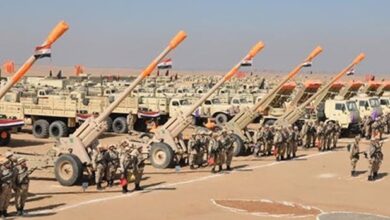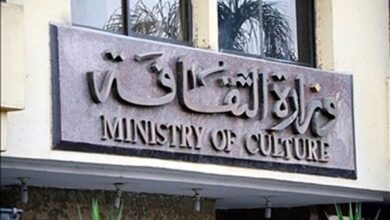The top news stories featured in Egyptian newspapers on Tuesday address the politicization of the Egyptian state’s economic and diplomatic relations with Israel on a new natural gas export contract, the military junta’s nationalistic flag-waving war games in Sinai, and heated presidential campaigns that are turning into mudslinging competitions.
State-owned Al-Gomhurriya dedicates most of its front page to patriotic propaganda in honor of Sinai Liberation Day, celebrated each year on 25 April. On that date in 1982, Egypt reclaimed the Sinai Peninsula from the Israeli occupation that began in 1967. The rest of the front page pays homage to the ruling military junta, the Supreme Council of the Armed Forces. The lyrics of a classic nationalistic song by songstress Shadia, dedicated to the reclaiming of Sinai, have been altered to read: “The gas has returned to us and Egypt celebrates its holiday today.”
The state-owned paper trumpets the (to be very temporary) cancellation of the gas export deal to Israel as being a great national victory. The report describes this act as being “a major accomplishment of the revolution” and “a gift for Sinai Liberation Day.”
Gas exports to Israel were officially cut off this Sunday, although the repeated bombing of the pipeline — some 14 times since the revolution — had actually disrupted gas exports several weeks earlier.
Quoting an anonymous “government source,” the independent Al-Shorouk newspaper runs a main headline reading: “Cessation of gas exports to Israel did not happen by chance.” According to this source, the timing of this cessation on the part of the Egyptian Natural Gas Holding Company (EGAS) coincided with Sinai Liberation Day, in an attempt by the SCAF to improve its public image in Egypt (temporarily) by ending the widely unpopular export contract.
Liberal opposition Al-Wafd newspaper reports, “Exploding the gas contract with Israel, in a politicized detonation.” Citing comments posted by Egyptian activists on Facebook, Al-Wafd mentions that this cessation of gas exports is “an act attempting to increase the SCAF’s popularity.”
The gas export deal between Egypt and Israel was signed in 2005. However, the deal was arranged through two private gas companies under the auspices of both states so as to have the Egyptian state distance itself from the hated deal.
This contract reportedly sold Egyptian gas at rates lower than market price to Israel — in effect subsidizing this fuel to the Jewish state at the expense of Egypt’s national budget. Al-Shorouk quotes Petroleum Minister Abdullah Ghorab: “The cessation of gas exports is due to commercial and contractual violations on Israel’s part. This decision is not governed by political motives, nor is it a reflection of the state’s political stance.”
In the independent Al-Tahrir newspaper: “Cessation of gas exports — until the re-negotiation of their price.” Quoting the controversial International Cooperation Minister Fayza Abouelnaga, the report reads, “We informed Israel of the possibility of resuming gas exports at a new price.”
Providing some sensationalist coverage, independent Youm7 mentions, “Gas war ignited between Egypt and Israel” along with “Israeli army: We are prepared for any confrontation if Egypt becomes an enemy.”
Meanwhile, in its attempt to polish up the public image of SCAF chief Field Marshal Hussein Tantawi, Al-Gomhurriya publishes large photos of Egyptian tanks and troops racing through the deserts of Sinai as the leader of the military junta and his subordinate generals inspect the war games.
In a display of patriotic machismo, Tantawi is quoted as saying: “We are strong. And we will break the hand of anybody who attempts to attack us.”
Needless to say, the state-owned paper does not mention the massive sums of taxpayer money being squandered on these purely symbolic war games. Instead Al-Gomhurriya focuses on the fact that these war games and maneuvers are being conducted in the Sinai, despite the provisions of the Camp David Accords stipulating that the peninsula should be demilitarized.
Al-Gomhurriya also quotes Tantawi as saying, “I will not leave Egypt until its safety and well-being are guaranteed.” In Al-Tahrir, Tantawi is quoted as saying: “I’m not a president or a politician, and this authority is like a fireball that was thrown in my lap.”
Al-Shorouk, quoting “legal and judicial sources,” mentions that the military council “will not give up authority until a constitutional document is issued” that clearly stipulates the powers of the Egyptian president, and that safeguards the interests of the military junta, along with the privileges of the military in general.
In other news, the Coptic Orthodox Church is reportedly taking punitive measures against Coptic Christians making pilgrimages to Jerusalem. The late Pope Shenouda III had issued a papal ban on such pilgrimages under Israeli occupation, but since his death over a month ago, thousands of Copts have reportedly made this pilgrimage.
According to Al-Wafd newspaper, leading church patriarchs are demanding lists of those Copts making the pilgrimage to deny them Holy Communion at church.
As for the coverage of the presidential race, its heated campaigns have apparently descended into mudslinging contests, with Amr Moussa slinging the most at the moment.
Youm7 runs a headline reading, “Moussa heats up presidential elections by mocking his contenders.” This paper mentions that Moussa, Mubarak’s former foreign minister and former secretary general of the Arab League, described the moderate Islamist candidate Abdel Moneim Abouel Fotouh as being “a sheikh” as opposed to a politician, while also dismissing the chances of Nasserist candidate Hamdeen Sabbahi. The paper also quotes Moussa: “I will be the president without the votes of the Muslim Brotherhood.”
Meanwhile, Al-Tahrir quotes Sabbahi, who responded to Moussa: “I don’t need his advice, nor his one-upmanship.” Abouel Fotouh’s campaigners responded: “We do not pay attention to interference of misinformation campaigns from others.”
Al-Tahrir runs another article mentioning that Mohamed Morsy, the former president of the Brotherhood’s Freedom and Justice Party, is facing a major political gamble with his presidential nomination. Under the headline, “The Brotherhood’s last bet,” Al-Tahrir mentions that both the Brotherhood and FJP are gambling with their political luck.
Morsy was the group’s backup candidate in case Khairat al-Shater — a multimillionaire businessmen and the Brotherhood’s chief financier — was disqualified from the race, which he was on 14 April. Following the 25 January uprising, the Brotherhood had announced it would not field a presidential candidate. The Brotherhood even expelled Abouel Fotouh last year when he announced that he’d run for president in defiance of the initial ban on running.
Al-Tahrir mentions that “the Muslim Brotherhood is attempting to deflect attention away” from its lies “by distracting people with its ramblings about the Constitutional Assembly. Yet it is unable to dodge the public’s anger and disillusionment.”
Egypt's papers:
Al-Ahram: Daily, state-run, largest distribution in Egypt
Al-Akhbar: Daily, state-run, second to Al-Ahram in institutional size
Al-Gomhurriya: Daily, state-run
Rose al-Youssef: Daily, state-run
Al-Dostour: Daily, privately owned
Al-Shorouk: Daily, privately owned
Al-Wafd: Daily, published by the liberal Wafd Party
Youm7: Daily, privately owned
Al-Tahrir: Daily, privately owned
Freedom and Justice: Daily, published by the Muslim Brotherhood's Freedom and Justice Party
Sawt al-Umma: Weekly, privately owned
Al-Arabi: Weekly, published by the Nasserist Party
Al-Nour: Official paper of the Salafi Nour Party




